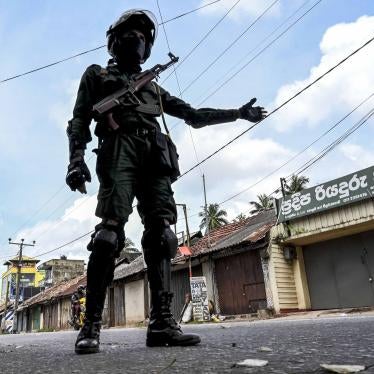(Washington D.C.) — The Pentagon’s new tribunals to review combatant status will not give detainees at Guantanamo a fair opportunity to challenge their detention, Human Rights Watch said today. The tribunals are expected to begin this week.
The tribunals are seriously flawed, Human Rights Watch said. They are not set up to be impartial, they will place severe limits on detainees’ ability to make their claims, and they are predicated on the Pentagon’s erroneous belief that all enemy combatants at Guantanamo can still be held under the laws of war.
Last month, the U.S. Supreme Court ruled that U.S. courts may hear claims from detainees at Guantanamo. Since then, more than 30 detainees have filed petitions for habeas corpus, asking the courts to decide whether their detention is lawful. Human Rights Watch is concerned that the U.S. Department of Defense is attempting to restrict the scope of court review by creating tribunals that will largely confirm the status quo, and that the Pentagon will then ask courts to defer to these tribunals when they hear a detainee’s case.
“The Pentagon is still trying to have complete control over the detainees’ fate,” said Wendy Patten, U.S. advocacy director at Human Rights Watch. “It hopes the new tribunals will deter careful scrutiny by the courts.”
The Pentagon moved quickly to establish the tribunals to review combatant status in response to two U.S. Supreme Court decisions in June on the Bush administration’s terrorism-related detention policies. In a strong rebuke, the court ruled that federal courts have jurisdiction to consider challenges to the legality of the detention of the foreign nationals held at Guantanamo. In the other case, the Supreme Court held that Yasser Hamdi, a U.S. citizen detained as an enemy combatant, must be given a meaningful opportunity to contest the factual basis for his detention before a “neutral decisionmaker.” The court said that this process possibly could take place before a military tribunal that meets these requirements. Detainees, however, can still ask U.S. courts to rule on the lawfulness of their detention.
Human Rights Watch questions whether the status review tribunals can be genuinely neutral and impartial. The military order creating these tribunals explicitly designates the detainees as enemy combatants, consistent with the position that senior U.S. military and administration officials have maintained for over two and a half years. To find that a detainee is not an enemy combatant, military officers on the panel will have to accept the claims put forward by a detainee over the stated position of their superiors.
“These tribunals presume that all of the detainees are enemy combatants,” said Patten. “But that’s the very issue the tribunals are supposed to be deciding.”
Under the Pentagon rules, the detainees cannot have a lawyer represent them before the status review tribunals. Each detainee will have a military officer appointed to serve as his representative, but anything the detainee tells his representative will not be confidential, and could be used in legal proceedings against him. While status review tribunals conducted under the Geneva Conventions do not require the participation of lawyers, those determinations happen on or near the battlefield in the aftermath of capture. Two and half years later and thousands of miles away, there is no legitimate reason to deny detainees the assistance of a lawyer in this first opportunity to contest the basis of their detention.
The process also assumes, incorrectly, that all enemy combatants held at Guantanamo may still be detained under the laws of war. Captured members of the Taliban armed forces should have been released and repatriated two years ago when Hamid Karzai became president of Afghanistan, ending the international armed conflict between the U.S. and Afghan governments. And terrorism suspects picked up far from any battlefield should never have been detained as enemy combatants. International law requires that such persons be charged with a criminal offense or released.
“These flawed tribunals come too late to bring Guantanamo in line with the Geneva Conventions,” said Patten.





